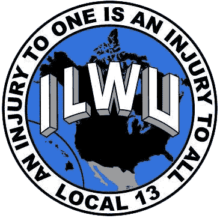Bulletin #07-21
February 2, 2021
COVID-19 VACCINE LINKS FOR LOS ANGELES, ORANGE COUNTY AND CITY OF LONG BEACH
Los Angeles County residents who are 65 years older may register online through http://publichealth.lacounty.gov/acd/ncorona2019/vaccine/hcwsignup/ Residents who don’t have computer access may call (833) 540-0473 between 8 a.m. and 8:30 p.m. for assistance with reservations.
Orange County residents 65 and older may register online through https://www.othena.com/
Long Beach City residents 65 and older may register online through http://www.longbeach.gov/health/diseases-and-condition/information-on/coronavirus/vaxlb/
Local 13 will notify you when the waterfront personnel will be vaccinated.
WHAT TO DO, AND NOT DO, BEFORE AND AFTER YOUR COVID VACCINE SHOT:
DO: Get your vaccine when it’s your turn.
Local 13 is currently working on a mass vaccination site. In the meantime, please visit the links above to see if you qualify.
DON’T: Let disinformation on vaccines cloud your judgment.
Social media is rife with disinformation about both COVID-19 and the vaccines that are available to prevent it. If you have doubts about the vaccine, get educated — the US Centers for Disease Control and Prevention is a trusted organization with vetted, science-based facts about the virus and available vaccines.
DO: Get vaccinated if you’ve already had COVID-19.
Reinfection with COVID-19 is definitively possible, the CDC says, so everyone needs to get a coronavirus vaccination, including those who have already had the illness. Check with your doctor before scheduling the vaccine.
DON’T: Get a shot if you currently have Covid-19 or have been exposed.
If you have tested positive for COVID-19 or been exposed to someone who has the illness, you should not go to the vaccination site to get your shot until your symptoms and isolation period have passed.
DO: Get the shot even if you still have COVID symptoms months later.
A growing number of people are becoming coronavirus “long-haulers” — people who continue to suffer fatigue, brain fog, aches, pains, headaches and more for months after the virus has left their systems. Don’t let your ongoing reactions keep you from getting the shot
DON’T: Get another type of vaccine within 14 days of the COVID-19 shot.
Wait at least 14 days before or after getting another vaccine, including a flu or shingles shot, to get a COVID-19 vaccination, the CDC says. However, if you inadvertently did get another vaccine within that two-week time frame, you should complete the COVID-19 series on schedule. As more information on how vaccines interact becomes available, the CDC says it may update this guidance.
DO: Tell vaccine staff about any allergies or past allergic reactions.
If you do have a history of immediate or severe allergic reactions to vaccines or other injections, try to have an EpiPen on hand
DON’T: Drive away before your 15- to 30-minute wait is up.
The CDC requires that everyone receiving a coronavirus vaccination wait 15 minutes at the vaccination site before driving away. If you have a history of severe allergic reactions, you’ll be required to wait 30 minutes to be sure you’re safe to drive. Both are a minor inconvenience, experts say, compared to the dangers of an adverse reaction of dizziness or worse while driving. Common reactions to the vaccine are soreness and swelling at the injection site.
DO: Get your second shot of vaccine within the recommended time frame.
Getting a second shot of the vaccine is needed to be sure that you have protection. Pfizer-BioNTech doses should be given 21 days apart, the CDC says, while the second dose of Moderna is administered 28 days after the first. Do not get your second dose early, but if you have trouble scheduling, waiting a few days after the due date — and perhaps longer — for either vaccine should not be an issue, the CDC says.
DO: Continue wearing masks and practicing social distancing after your shots.
Continue to wear your masks and practice appropriate social distancing after both your first and second doses of vaccine, the CDC says. The first dose will not produce enough of an immune response to protect you or others. The second dose should provide approximately 95% protection within one to two weeks after administration, depending on the vaccine. However, the CDC says, even after you are fully vaccinated you may still be a silent carrier of the coronavirus.
So to protect others, continue to wear a mask over your nose and mouth, stay at least 6 feet away from others, avoid crowds and crowded and poorly ventilated spaces, and wash your hands often for at least 20 full seconds.
“This information is taken from the Center for Disease Control and other sources and we encourage you to seek the advice of your medical provider.”
Fraternally,
Ramon Ponce de Leon Jesse Enriquez Mark Williams
President Vice President Secretary/Treasurer

